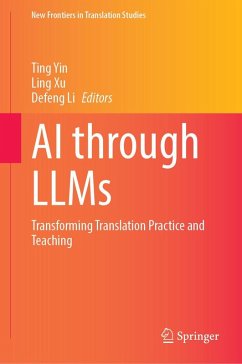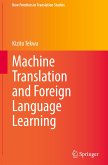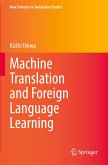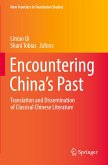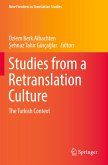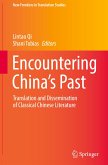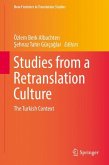AI Through LLMs
Transforming Translation Practice and Teaching
Herausgegeben:Yin, Ting; Xu, Ling; Li, Defeng
AI Through LLMs
Transforming Translation Practice and Teaching
Herausgegeben:Yin, Ting; Xu, Ling; Li, Defeng
- Gebundenes Buch
- Merkliste
- Auf die Merkliste
- Bewerten Bewerten
- Teilen
- Produkt teilen
- Produkterinnerung
- Produkterinnerung
This book explores the transformative impact of artificial intelligence (AI) on the field of translation. As technology advances, AI-driven tools and methodologies are reshaping traditional translation workflows, redefining the roles of translators, and enhancing both efficiency and accuracy in translation tasks. Through comprehensive analyses and case studies, this book offers valuable insights into how AI is driving innovation in both translation practice and education, fostering a future where human creativity and technological advancements work in tandem to meet the demands of an increasingly globalized world. …mehr
Andere Kunden interessierten sich auch für
![Researching Translator's Functional Style Researching Translator's Functional Style]() Kan WuResearching Translator's Functional Style90,99 €
Kan WuResearching Translator's Functional Style90,99 €![Machine Translation and Foreign Language Learning Machine Translation and Foreign Language Learning]() Kizito TekwaMachine Translation and Foreign Language Learning121,99 €
Kizito TekwaMachine Translation and Foreign Language Learning121,99 €![Machine Translation and Foreign Language Learning Machine Translation and Foreign Language Learning]() Kizito TekwaMachine Translation and Foreign Language Learning121,99 €
Kizito TekwaMachine Translation and Foreign Language Learning121,99 €![Encountering China's Past Encountering China's Past]() Encountering China's Past121,99 €
Encountering China's Past121,99 €![Studies from a Retranslation Culture Studies from a Retranslation Culture]() Studies from a Retranslation Culture38,99 €
Studies from a Retranslation Culture38,99 €![Encountering China's Past Encountering China's Past]() Encountering China's Past121,99 €
Encountering China's Past121,99 €![Studies from a Retranslation Culture Studies from a Retranslation Culture]() Studies from a Retranslation Culture38,99 €
Studies from a Retranslation Culture38,99 €-
-
-
This book explores the transformative impact of artificial intelligence (AI) on the field of translation. As technology advances, AI-driven tools and methodologies are reshaping traditional translation workflows, redefining the roles of translators, and enhancing both efficiency and accuracy in translation tasks. Through comprehensive analyses and case studies, this book offers valuable insights into how AI is driving innovation in both translation practice and education, fostering a future where human creativity and technological advancements work in tandem to meet the demands of an increasingly globalized world.
Produktdetails
- Produktdetails
- New Frontiers in Translation Studies
- Verlag: Springer, Berlin; Springer
- Artikelnr. des Verlages: 89566560
- Seitenzahl: 320
- Erscheinungstermin: 10. Februar 2026
- Englisch
- Abmessung: 235mm x 155mm
- ISBN-13: 9789819547975
- ISBN-10: 9819547970
- Artikelnr.: 75676673
- Herstellerkennzeichnung
- Springer-Verlag GmbH
- Tiergartenstr. 17
- 69121 Heidelberg
- ProductSafety@springernature.com
- New Frontiers in Translation Studies
- Verlag: Springer, Berlin; Springer
- Artikelnr. des Verlages: 89566560
- Seitenzahl: 320
- Erscheinungstermin: 10. Februar 2026
- Englisch
- Abmessung: 235mm x 155mm
- ISBN-13: 9789819547975
- ISBN-10: 9819547970
- Artikelnr.: 75676673
- Herstellerkennzeichnung
- Springer-Verlag GmbH
- Tiergartenstr. 17
- 69121 Heidelberg
- ProductSafety@springernature.com
Associate Professor Ting Yin teaches at the School of Foreign Languages, Guangdong Polytechnic Normal University, China, where she serves as Chair of the English Department. Her research focuses on artificial intelligence in translation and language education, particularly technology-enhanced pedagogy. She is also a Council Member of the Guangdong Translators Association. As editor of AI through LLMs: Transforming Translation Practice and Teaching, she brings extensive teaching and research experience. Her recent projects, including A Study on the Intervention Model of Foreign Language Learners in the Digital Era (Guangdong “14th Five-Year Plan”), demonstrate her innovative approach to integrating AI into translation education. Professor Ling Xu is Dean of the Faculty of Foreign Languages at Guangdong Polytechnic Normal University, China. Her research focuses on English education and teacher development. She is a Member of the Sub-Committee on English under the Steering Committee for Foreign Language Majors in Guangdong Provincial Universities, and a Member of the Professional Committee for Teaching Guidance in Basic Education of Guangdong Province. She also serves as Deputy Secretary-General of WITTA, Vice President of the Guangdong Translators Association, and Vice President of the Chinese Culture Communication Committee under the Association for Comparative Studies of English and Chinese. Professor Xu has led multiple national and provincial projects, published extensively, and authored three translated volumes and four textbooks. She has received numerous awards, including the First Prize of the Guangdong Teaching Achievement Award. Professor Defeng Li is a distinguished scholar in translation studies, known for research in cognitive translation studies, corpus-assisted translation studies, and translation education. He is Distinguished Professor of Translation Studies and Associate Dean at the Faculty of Arts and Humanities, University of Macau, and Director of the Centre for Studies of Translation, Interpreting and Cognition. Professor Li is also President of WITTA and President of the International Association of Translation, Interpreting and Cognition (IATIC). He holds a Ph.D. in Secondary Education (Second Language Education) from the University of Alberta, Canada, and an M.A. in English Language and Literature (Translation Studies) from Nanjing Normal University, China. His academic career includes appointments at the University of London (Reader in Translation Studies and Chair of the Centre for Translation Studies) and the Chinese University of Hong Kong (Associate Professor and Professor in Translation Studies). He has published numerous articles and monographs, contributing significantly to translator cognition, corpus-based methodologies, and translation pedagogy.
Part I. Re
mapping the Landscape: From Practice to Paradigm.
Chapter 1. Large Language Model
driven Intelligent Translation: How New Technologies are Reshaping Translation Practices? (Huashu Wang).
Chapter 2. Hybrid Translation Production: The Whole
Process AI
Empowerment (Wenzhong He).
Chapter 3. Postdigital Translation in the Age of Algorithms: Implications for Practice and Pedagogy (Tong King Lee).
Part II. Quality, Evaluation and Translationese.
Chapter 4. Translationese: Can AI Refinement Techniques Completely Eradicate Translational Distortions? (Xu Bin).
Chapter 5. Comparing Generative AI and Traditional Machine Translation Systems: An Assessment of Computer Errors and the Human Post
editing Process (Kizito Tekwa).
Chapter 6. LLM
Based Machine Interpreting Evaluation: Implications for Interpreter Education in the Age of AI (Zixuan Wang).
Chapter 7. An Empirical Study on AI
Driven Evaluation of Student Translations Using Large Language Models (Peng Sirui).
Part III. Re
imagining the Classroom: Resources, Tasks, Engagement.
Chapter 8. Shifting the Translation Paradigm through AI
driven Approaches: A Case Study of Game Localization with LLMs (Lintao Han).
Chapter 9. Enhancing Translation Education with the AI
Integrated Corpus Platform: Design, Application, and Pedagogical Benefits (Simin Xu).
Chapter 10. Exploring Learner Engagement in AI
assisted Interpreting Training: A Multiple Case Mixed
Methods Study (Ting Yin).
mapping the Landscape: From Practice to Paradigm.
Chapter 1. Large Language Model
driven Intelligent Translation: How New Technologies are Reshaping Translation Practices? (Huashu Wang).
Chapter 2. Hybrid Translation Production: The Whole
Process AI
Empowerment (Wenzhong He).
Chapter 3. Postdigital Translation in the Age of Algorithms: Implications for Practice and Pedagogy (Tong King Lee).
Part II. Quality, Evaluation and Translationese.
Chapter 4. Translationese: Can AI Refinement Techniques Completely Eradicate Translational Distortions? (Xu Bin).
Chapter 5. Comparing Generative AI and Traditional Machine Translation Systems: An Assessment of Computer Errors and the Human Post
editing Process (Kizito Tekwa).
Chapter 6. LLM
Based Machine Interpreting Evaluation: Implications for Interpreter Education in the Age of AI (Zixuan Wang).
Chapter 7. An Empirical Study on AI
Driven Evaluation of Student Translations Using Large Language Models (Peng Sirui).
Part III. Re
imagining the Classroom: Resources, Tasks, Engagement.
Chapter 8. Shifting the Translation Paradigm through AI
driven Approaches: A Case Study of Game Localization with LLMs (Lintao Han).
Chapter 9. Enhancing Translation Education with the AI
Integrated Corpus Platform: Design, Application, and Pedagogical Benefits (Simin Xu).
Chapter 10. Exploring Learner Engagement in AI
assisted Interpreting Training: A Multiple Case Mixed
Methods Study (Ting Yin).
Part I. Re
mapping the Landscape: From Practice to Paradigm.
Chapter 1. Large Language Model
driven Intelligent Translation: How New Technologies are Reshaping Translation Practices? (Huashu Wang).
Chapter 2. Hybrid Translation Production: The Whole
Process AI
Empowerment (Wenzhong He).
Chapter 3. Postdigital Translation in the Age of Algorithms: Implications for Practice and Pedagogy (Tong King Lee).
Part II. Quality, Evaluation and Translationese.
Chapter 4. Translationese: Can AI Refinement Techniques Completely Eradicate Translational Distortions? (Xu Bin).
Chapter 5. Comparing Generative AI and Traditional Machine Translation Systems: An Assessment of Computer Errors and the Human Post
editing Process (Kizito Tekwa).
Chapter 6. LLM
Based Machine Interpreting Evaluation: Implications for Interpreter Education in the Age of AI (Zixuan Wang).
Chapter 7. An Empirical Study on AI
Driven Evaluation of Student Translations Using Large Language Models (Peng Sirui).
Part III. Re
imagining the Classroom: Resources, Tasks, Engagement.
Chapter 8. Shifting the Translation Paradigm through AI
driven Approaches: A Case Study of Game Localization with LLMs (Lintao Han).
Chapter 9. Enhancing Translation Education with the AI
Integrated Corpus Platform: Design, Application, and Pedagogical Benefits (Simin Xu).
Chapter 10. Exploring Learner Engagement in AI
assisted Interpreting Training: A Multiple Case Mixed
Methods Study (Ting Yin).
mapping the Landscape: From Practice to Paradigm.
Chapter 1. Large Language Model
driven Intelligent Translation: How New Technologies are Reshaping Translation Practices? (Huashu Wang).
Chapter 2. Hybrid Translation Production: The Whole
Process AI
Empowerment (Wenzhong He).
Chapter 3. Postdigital Translation in the Age of Algorithms: Implications for Practice and Pedagogy (Tong King Lee).
Part II. Quality, Evaluation and Translationese.
Chapter 4. Translationese: Can AI Refinement Techniques Completely Eradicate Translational Distortions? (Xu Bin).
Chapter 5. Comparing Generative AI and Traditional Machine Translation Systems: An Assessment of Computer Errors and the Human Post
editing Process (Kizito Tekwa).
Chapter 6. LLM
Based Machine Interpreting Evaluation: Implications for Interpreter Education in the Age of AI (Zixuan Wang).
Chapter 7. An Empirical Study on AI
Driven Evaluation of Student Translations Using Large Language Models (Peng Sirui).
Part III. Re
imagining the Classroom: Resources, Tasks, Engagement.
Chapter 8. Shifting the Translation Paradigm through AI
driven Approaches: A Case Study of Game Localization with LLMs (Lintao Han).
Chapter 9. Enhancing Translation Education with the AI
Integrated Corpus Platform: Design, Application, and Pedagogical Benefits (Simin Xu).
Chapter 10. Exploring Learner Engagement in AI
assisted Interpreting Training: A Multiple Case Mixed
Methods Study (Ting Yin).

